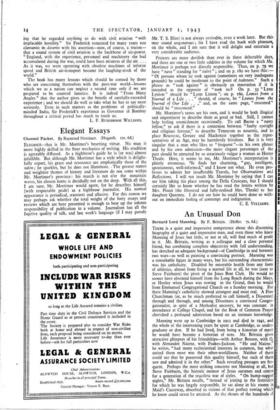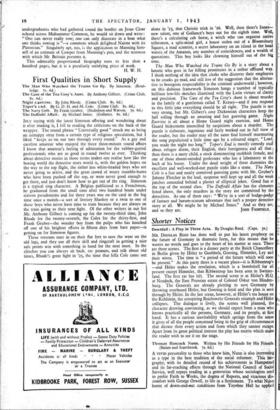An Unusual Don
Bernard Lord Manning. By F. Brittain. (Helfer. 7s. 6d.) THERE is a quiet and impressive competence about this discerning biography of a quiet and impressive man, and even those who knew Manning of Jesus but little, or not at all, will find much of profit in it. Mr. Brittain, writing as a colleague and a close personal friend, but combining complete objectivity with full understanding, has sketched an adequate background—of Cambridge in and between two wars—as well as painting a convincing portrait. Manning was a remarkable figure in many ways, but his outstanding characteristic was his catholicity. Disabled by miserable health from any form of athletics, almost from living a normal life at all, he was (next to Steve Fairbairn) the pivot of the Jesus Boat Club. He would no sooner have absented himself from the Long Reach during the Mays, or Henley when Jesus was rowing in the Grand, than he would from Emmanuel Congregational Church on a Sunday morning. For there Manning's catholicity showed strongest and most real. A Free Churchman (or, as he much preferred to call himself, a Dissenter) through and through, and among Dissenters a convinced Congregationalist, in spite of a Methodist ancestry, he was constant in attendance at College Chapel, and for the Book of Common Prayer cherished a profound admiration -based on an intimate knowledge.
Manning went up to Cambridge in 1912 and died in 1941, and the whole of the intervening years he spent at Cambridge, as undergraduate or don. If he had lived, from being a historian of merit he would have become a historian of note. Mr. Brittain gives attractive glimpses of his friendships—with Arthur Benson, with Q, with Alexander Nairne, with Foakes-Jackson. "He and Naime," he writes, "had many ecclesiastical interests in common, but what united them most was their other-worldliness. Neither of them could see that he possessed this quality himself, but each of them saw and admired it in the other." Such revealing passages are frequent. Perhaps the most striking concerns not Manning at all, but Steve Fairbairn, the historic mentor of Jesus oarsmen and centre for a generation of the truceless war of styles. "On bump-supper nights," Mr. Brittain recalls, "instead of joining in the festivities for which he was largely responsible, he sat alone in his rooms in Maid's Causeway, absorbed in visions of that perfect rowing which he knew could never i.e attained. As the shouts of the hundreds of undergraduates who had gathered round the bonfire on Jesus Close echoed across Midsummer Common, he would sit down and write: "One can never really row; one can only illustrate in a boat what one thinks rowing is "—a comment which delighted Nairne with its Platonism." Singularly apt, too, i3 the application to Manning himself of an estimate ot Cowper from Manning's pen, and the neatness with which Mr Brittain presents it.
This admirably proportioned biography runs to less than a hundred pages, but it is a peculiarly satisfying piece of work.
H. W. H.























 Previous page
Previous page